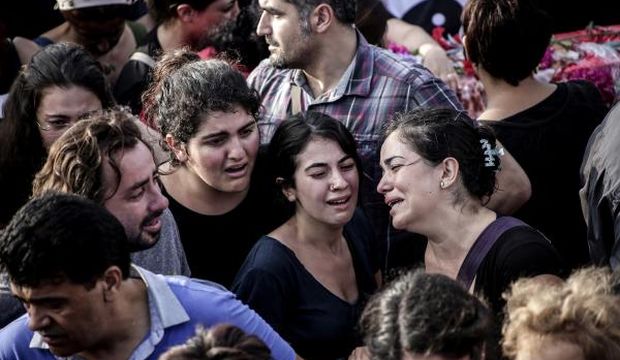
Mourners attend the funeral of the victims of a suicide bomb attack which took place two days earlier in the southern Turkish town of Suruç, on July 22, 2015 at the Gazi district in Istanbul. (AFP Photo/Yasin Akgul)
Suruç and Beirut, Asharq Al-Awsat—Turkish authorities have identified a suspected suicide bomber who on Monday killed 32 people and injured 100 in the Turkish district of Suruç near the Syrian border.
Prime Minister Ahmet Davutoğlu made the announcement on Wednesday and said initial investigations revealed it was likely the suicide bomber had links to the Islamic State of Iraq and Syria (ISIS), though he did not name the suspect.
Police officials speaking to Turkish state-run news agency Anadolu however identified the suspect as 20-year-old Seyh Abdurrahman Alagoz. They said the suspect’s Turkish ID card had been found at the site of the bombing.
The sources said Alagoz and his brother Yunus Emre had left their home in the southeastern province of Adıyaman six months ago.
A senior Turkish official speaking to Reuters said Alagoz headed to neighboring Syria and was “active in a Syria-linked group supporting [ISIS].”
According to Turkish media reports, Alagoz’s mother said he had returned home on July 12—eight days before the attack—and then disappeared.
Monday’s attack targeted a group of activists who had gathered in Suruç in preparation for a trip they were planning to help rebuild the Syrian border town of Kobane.
The town has seen fierce fighting between ISIS and Syrian–Kurdish groups over the past 12 months, with many residents forced to flee to neighboring Turkey amid the devastation.
ISIS recruits have repeatedly used the Turkish border to head to Syria in order to join the group. Turkey’s ruling Justice and Development Party (AKP) has been accused of turning a blind eye to the movement of fighters across the 590-mile (950-kilometer) border.
Speaking to reporters on Tuesday in the Şanlıurfa province, where Suruç is located, Davutoğlu denied accusations that Turkey had been tacitly supporting ISIS.
“Turkey and AKP governments have never had any direct or indirect links with any terrorist group and have never showed tolerance to any terrorist group,” he said, in comments carried by Reuters.
Several protests have broken out in Istanbul and Ankara since Monday, with demonstrators blaming the AKP government and President Recep Tayyip Erdoğan for the attack. In Istanbul some protesters chanted, “Murderer ISIS, collaborator Erdoğan and AKP” as they marched through a major shopping district, Reuters reported.
Leftist Turkish daily soL recently reported that ISIS had threatened the AKP with attacks on Turkish soil after the government closed down a Turkish-language website the extremist group had been using to recruit fighters from Turkey.
Following international criticism, Ankara has been clamping down on illegal traffic through its border into Syria. In April authorities deported some 1,300 people from Turkey who were suspected of attempting to cross into Syria illegally in order to join ISIS.
Speaking to Asharq Al-Awsat, Turkish analyst Noman Aralık said the “uneasy alliance” between Turkey and ISIS had now collapsed following the recent measures taken by the government, and that Turkish intelligence had received “numerous warnings” from the group regarding an imminent attack.
He said Ankara had previously found in ISIS “a pragmatic ally” to counter Kurdish groups in Iraq and Syria.
Ankara fears rising influence from Kurdish groups could lead to greater calls for independence from Kurds in Turkey.
Kurdish separatist group the Kurdistan Workers Party (PKK) on Wednesday claimed responsibility for the assassination of two Turkish police officers in the southeastern town of Ceylanpınar. In a statement, the group said the action was carried out in retaliation for the government’s “collaboration with the Da’esh [ISIS] gangs.”
